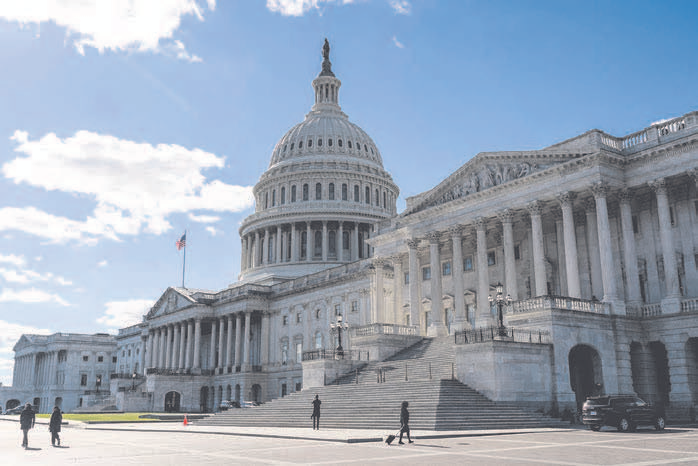
By Charlie Savage
President-elect Donald Trump’s insistence that Senate Republicans forego their duty in scrutinizing his nominees presents a significant early challenge in determining if his second term will adopt a more radical approach than his previous one.
Over the weekend, Trump took to social media to demand that Republicans appoint a new Senate majority leader who would be prepared to enact recesses, permitting him to make unilateral appointments without the usual confirmation process. His supporters quickly endorsed this notion, escalating pressure on GOP members to comply.
The call to diminish checks and balances and commandeer some traditional legislative powers highlighted Trump’s authoritarian tendencies. Although Trump’s request faces no apparent legal hurdles, it would represent a remarkable breach of constitutional customs. Historically, there has been no precedent for the Senate to collectively and intentionally abandon its role in confirming or rejecting presidential nominations for positions of governmental authority.
Ed Whelan, a legal analyst who has backed Trump’s judicial choices yet criticized Trump himself, raised concerns on Tuesday in an article for the conservative National Review. He suggested that the former and future president appears to be considering “a dreadful and unconstitutional notion.”
Recess appointees who assume office without Senate confirmation gain the complete authority of their roles until the Senate session concludes. Given that each congressional session generally spans a year, anyone receiving a recess appointment from Trump in early 2025 could potentially remain in office until late 2026.
The Constitution typically mandates that the president must secure Senate approval to appoint key executive branch officials, partly to prevent the administration from placing unsuitable individuals in high-ranking positions.
However, in the nation’s formative years, when travel relied on horses, the Senate frequently found itself out of session for extended periods, unable to reconvene quickly when critical vacancies emerged requiring urgent attention. Consequently, the founders included a provision in the Constitution that permits presidents to temporarily fill vacancies without Senate approval when the Senate is not in session.
This recess appointment clause has become outdated in contemporary times, as the Senate convenes year-round and can readily gather when necessary. Still, despite its original intent being rendered obsolete, it remains enshrined in the Constitution.
While some of Trump’s nominees are likely to be fellow members of Congress, who would presumably be easily confirmed by the Republican-led Senate, recess appointments would eliminate a crucial check on Trump, particularly as he has shown intent to grant influential positions to more extreme allies who may struggle to secure confirmation.
As Alexander Hamilton noted in the Federalist Papers, writings aimed at defending the Constitution, the presence of this confirmation process itself acts as a safeguard against the appointment of “unfit” officials.
“A person who had sole control over the appointment of offices would be significantly driven by personal desires and interests compared to when they were obliged to subject the validity of their selections to discussion and evaluation by a distinct and independent body—specifically, an entire legislative branch,” Hamilton expressed.
The Supreme Court has established that Senate recesses lasting at least ten days are adequate for a president to bypass confirmation for appointees. To facilitate this for Trump, the majority leader would need to propose a motion to adjourn for at least that period. The Senate would then conduct a straightforward majority vote.
If the adjournment motion fails, the Senate would continue its session. With Republicans maintaining a slender 53-47 majority, it would require four Republicans to dissent and ally with Democrats to thwart Trump’s initiative.
There are multiple reasons to believe that the safeguards and constraints that occasionally curtailed Trump during his unprecedented first term may be diminished in his upcoming second term.
His initial team in 2017 often displayed dysfunction; however, those who remained learned to navigate power more adeptly. His political appointees previously acted to temper his impulses, yet this time, his associates are committed to avoiding the appointment of officials who might feel a responsibility to impose limits on him. Judicial appointments that previously faced obstacles from courts have now shifted in his favor.
During Trump’s first term, Republican legislators with independent standing occasionally showed readiness to criticize his rhetoric or restrain his more disruptive ideas. Yet, as time has passed, the Republican Party has increasingly normalized Trump’s tendency to cross boundaries. He has managed to outlast, exhaust, or expel his GOP detractors, hinting that Congressional Republicans might now be even more malleable.
Trump’s call for the Senate to step back and allow him to make widespread recess appointments constitutes a daring initial effort to gauge the response.
Although past presidents have occasionally made a few recess appointments, none have attempted to systematically circumvent Senate approval to unilaterally staff their administrations. It remains unclear whether Republican senators, wary of Trump’s potential to jeopardize their careers by supporting a primary challengers, will concede one of their most vital powers and prerogatives.
On social media, Trump claimed that permitting him to enact recess appointments would circumvent what he characterized as prior delays in advancing nominees, asserting, “We need positions filled IMMEDIATELY!”
